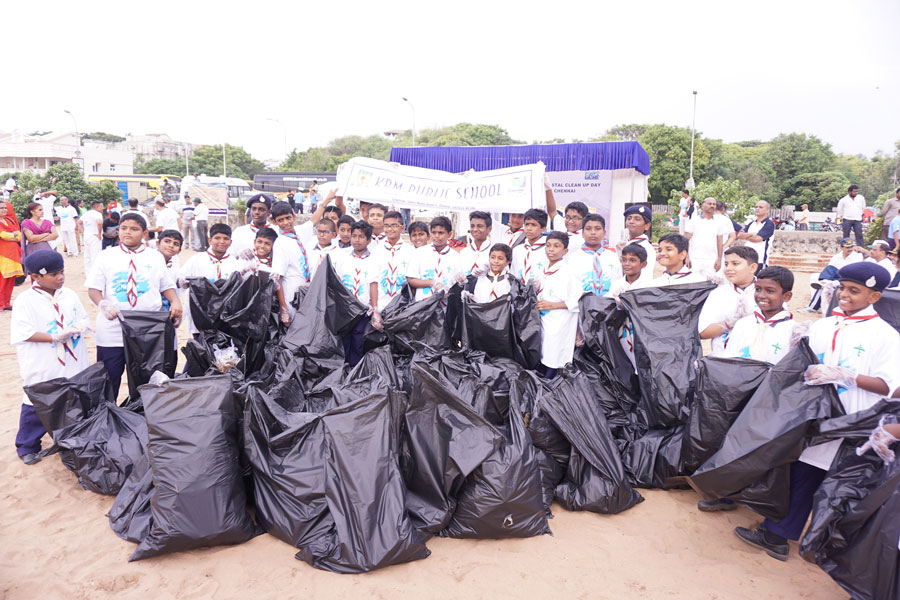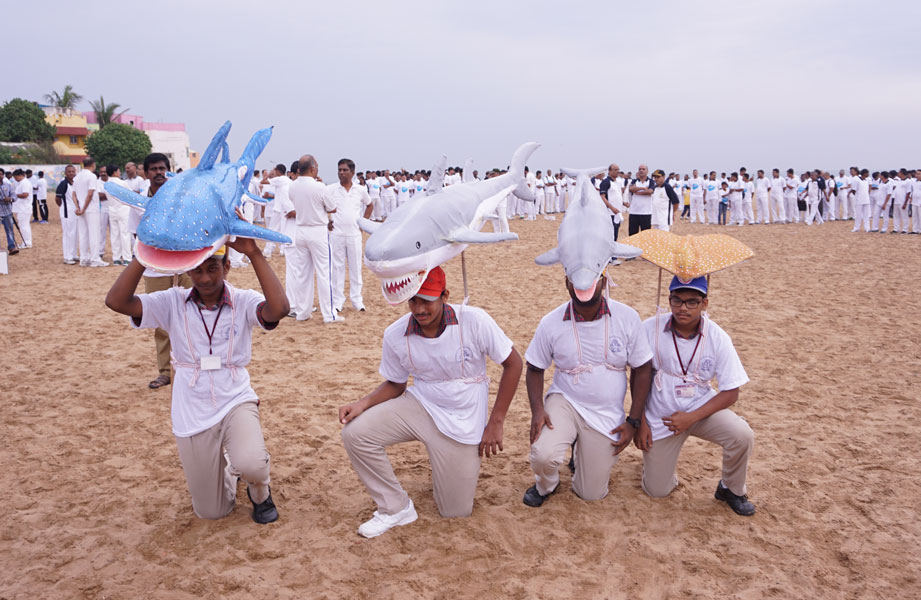
Over 2,000 volunteers from corporates, schools, colleges, government agencies and NGOs of Chennai thronged the Elliot’s Beach on a Sunday morning. Armed with huge polythene sacks and wearing gloves, they scoured the beach, and cleared it of garbage.
On the third week of September every year, the Indian Coast Guard organises the beach clean up across its 42 CG stations to mark the International Coastal Clean up (ICC) Day on September 16. ICC is part of the UN Environmental Programme Initiative that began in 1986 to engage local volunteers in cleaning the oceans and create awareness on marine diversity in the younger generation. As part of their broader agenda, ICC Day was observed to conserve and protect the marine ecology across the coastal regions of the world.
Flagging off the event, Coast Guard (Eastern Region) Commander and IG Rajan Bargotra warned that humans were testing the patience of the oceans by using them as a “bottomless sink” to dump all sorts of garbage. “The capacity of tolerance for accepting our abuse, treating oceans as one large sink, is unacceptable and will be beyond repair if we don’t stop disposing of waste in canals, rivers and lakes, the waters of which finally end up in the ocean,” he said.
Grave pollution
Senior Scientist D Mohan from the Indian Coastal and Marine Area Management, Union Ministry of Earth Sciences, decried the harmful practice of polluting the seas. “We are selfish in keeping our homes clean, but don’t bother about our surroundings which will affect us eventually.” He noted nearly 55 per cent of beach garbage and litter on water bodies consist of non-biodegradable things like plastics, while fishermen were guilty of throwing bio-waste, amounting nearly 2 per cent of total garbage. “We have to chart out multi-fold efforts towards a trash-free ocean which will be our greatest wealth,” he said.
The maritime force is taking efforts to protect the marine species too. “We have distributed TEDs — Turtle Exclusion Device — to fishermen who can now use them in their trawlers to prevent the death of sea turtles,” said a Coast Guard pilot.
Volunteers Linda Gerberch, from Cleveland, Ohio, and Lou Courtois from Normandy, France, who were busy collecting garbage, paused to say, “Poor beaches are suffering all over the world. Coastal degradation is same everywhere and global action has to be intensified for quick results.”
Roshan Rajagopal and Sharmila Pasupathy, part of a 75-plus team from the HSBC Bank, said they were happy to exert themselves for a good cause to make the beach clean.
The Municipal officials later declared that around 2–2.5 tonnes of solid waste was collected at the end of the three-hour drive. The civic body will segregate and slot the garbage, some of which will be transported to the dump yards as refills.
Rotary pitches in
RC Guindy, D 3232, joined hands with the Indian Maritime Foundation (IMF), Chennai branch, to take part in the ICC Day proceedings. Over 50 Rotarians and Rotaractors took part in the clean up in the Chennai leg of the IMF’s drive across South India for trash-free seas.
“The overall objective is to make water bodies garbage-free, create awareness on waste segregation and safe disposal of collected garbage,” said Badri Narayanan, Chair, Rotaract Committee, RC Guindy.

Last year, IMF collected over 35 tonnes of garbage across the selected blocks in South India. “This year, the collected waste is expected to be 10 per cent lesser due to better awareness in coastal areas,” he said.
After the flag-off involving a salute from Navy cadets, DG R Srinivasan presented a cheque of Rs 50,000 to the IMF President Commodore Rajan Vir for their clean up efforts. Former Tamil Nadu DGP and legislator R Natraj and film celebrity Suhasini Maniratnam were the guests of honour.






